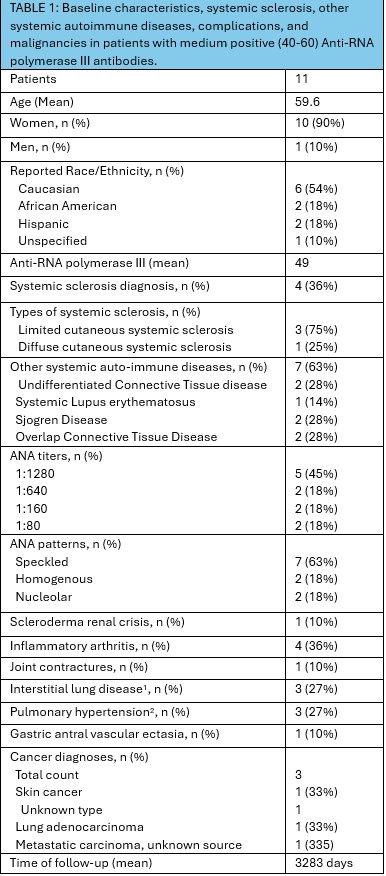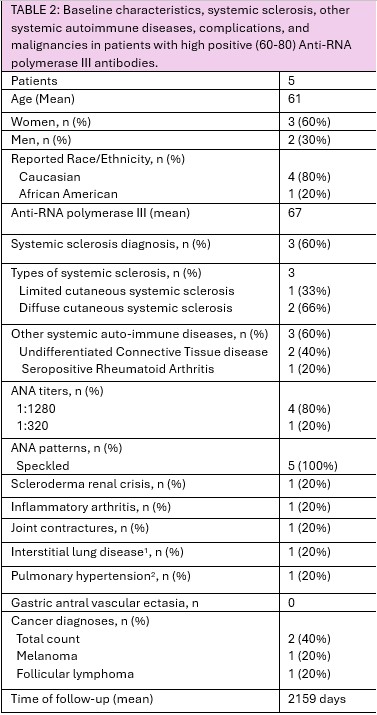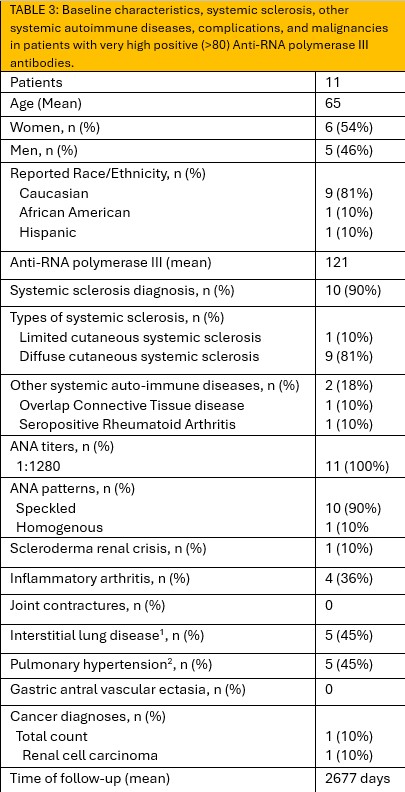Session Information
Session Type: Poster Session B
Session Time: 10:30AM-12:30PM
Background/Purpose: Anti-RNA polymerase III antibody (ARA) is a disease-specific antibody important for the identification and stratification of varying phenotypes of systemic sclerosis (SSc). Previous studies have observed a correlation between increasing ARA and increased risk of cancer as well as progression to diffuse systemic sclerosis1,2. This study assesses the clinical scenario of interpreting the level of RNA polymerase III with clinical manifestations.
Methods: A retrospective chart review was conducted at a single tertiary center. Included patients were between 18-80 years old with greater than or equal to moderate positive anti-RNA polymerase III antibody (40 U and higher) as identified by the Mayo Clinic Laboratories references (ELISA) during 1/1/2013 – 12/31/20203. During data acquisition, notable characteristics identified were complications of systemic sclerosis, comorbid autoimmune diagnoses as diagnosed by a rheumatologist, anti-nuclear antibody (ANA) titers, and malignancies.
Results: A total of 27 patients were included, 19 (70%) women and 8 (30%) men with a mean age of 61 years old. Among these patients, 11 (41%) had ARA values within the medium range (40-60), 5 (19%) had ARA values within the high range (60-80), and 11 (40%) had ARA values in the very high range ( >80). A diagnosis of systemic sclerosis (limited or diffuse) was made in 36% of patients in the medium range, 60% in the high range, and 90% in the very high range. Of those diagnosed with SSc, the prevalence of diffuse systemic sclerosis in these patients was 25%, 66%, and 90% in the medium, high, and very high ARA value cohorts, respectively. Comorbid autoimmune disorders were present in 63% of medium value patients, 60% of high value patients, and only 18% of very high patients. Across all ranges, 68% of patients had an ANA titer of 1280 with 85% of those staining patterns being speckled. Before or after ARA positivity, 27% of medium range, 40% of high range, and 10% of very high range patients had a cancer diagnosis (Table 1, 2 and 3).
Conclusion: This study observes an inverse relationship between comorbid autoimmune diseases and increasing ARA values while reinforcing the previously identified correlation between increasing ARA values and prevalence of diffuse systemic sclerosis, an increased cancer risk, and increasing ANA titers.
Superscript 1: Per CT chest reading
Superscript 2: defined as mean pulmonary artery pressure > 20 mmHg per echocardiography or right heart catheterization
Superscript 1: Per CT chest reading
Superscript 2: defined as mean pulmonary artery pressure > 20 mmHg per echocardiography or right heart catheterization
Superscript 1: Per CT chest reading
Superscript 2: defined as mean pulmonary artery pressure > 20 mmHg per echocardiography or right heart catheterization
To cite this abstract in AMA style:
Balaja W, Badshah M, Krause M. Association of Systemic Sclerosis and Other Systemic Autoimmune Disease Diagnosis with Increasing Anti-RNA Polymerase III Antibodies [abstract]. Arthritis Rheumatol. 2024; 76 (suppl 9). https://acrabstracts.org/abstract/association-of-systemic-sclerosis-and-other-systemic-autoimmune-disease-diagnosis-with-increasing-anti-rna-polymerase-iii-antibodies/. Accessed .« Back to ACR Convergence 2024
ACR Meeting Abstracts - https://acrabstracts.org/abstract/association-of-systemic-sclerosis-and-other-systemic-autoimmune-disease-diagnosis-with-increasing-anti-rna-polymerase-iii-antibodies/



